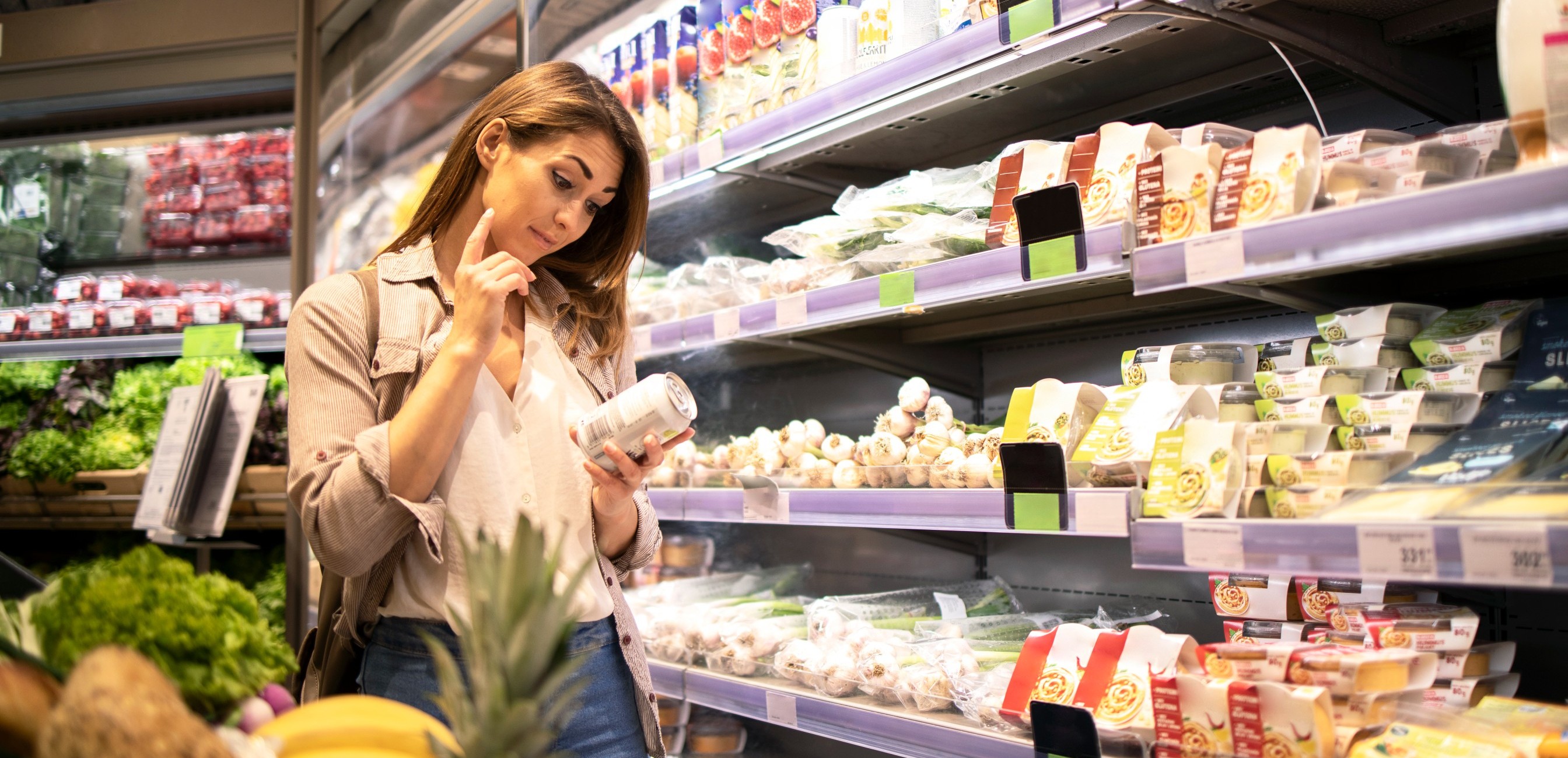
🥥Want to explore more topics like this? Visit our full blog for the latest articles.
In short, they are formulated to be hyper-palatable and make you eat more, and by highly profitable to make them earn more, in particular from large corporations experts at skirting around the edges of legislation.
"𝘜𝘭𝘵𝘳𝘢-𝘱𝘳𝘰𝘤𝘦𝘴𝘴𝘦𝘥 𝘧𝘰𝘰𝘥𝘴 𝘢𝘳𝘦 𝘥𝘦𝘴𝘪𝘨𝘯𝘦𝘥 𝘵𝘰 𝘳𝘦𝘱𝘭𝘢𝘤𝘦 𝘶𝘯𝘱𝘳𝘰𝘤𝘦𝘴𝘴𝘦𝘥 𝘰𝘳 𝘮𝘪𝘯𝘪𝘮𝘢𝘭𝘭𝘺 𝘱𝘳𝘰𝘤𝘦𝘴𝘴𝘦𝘥 𝘧𝘰𝘰𝘥𝘴 𝘢𝘯𝘥 𝘤𝘶𝘭𝘪𝘯𝘢𝘳𝘺 𝘱𝘳𝘦𝘱𝘢𝘳𝘢𝘵𝘪𝘰𝘯𝘴, 𝘢𝘯𝘥 𝘵𝘩𝘦𝘺 𝘢𝘳𝘦 𝘥𝘦𝘴𝘪𝘨𝘯𝘦𝘥 𝘢𝘭𝘴𝘰 𝘵𝘰 𝘣𝘦 𝘰𝘷𝘦𝘳-𝘤𝘰𝘯𝘴𝘶𝘮𝘦𝘥"
(Prof C. Monteiro)
and it works, as demonstrated in Dr. Hall's well acknowledged study (sumarized here: https://www.gococo.app/post/ultra-processed-foods-weight).
There is much common ground between UPFs and HFSS (nutrient-based approach), but also some discrepancy. As they do not necessarilly trigger the same adverse health effects, this means that you cannot solely consider one or the other.
Some particular adverse health impacts, specific to UPF and not related to HFSS are for example:
- the gut microbiome (which can lead to other impacts),
- mental health
"𝘩𝘪𝘨𝘩 𝘪𝘯 𝘧𝘰𝘰𝘥𝘴 𝘥𝘰𝘯'𝘵 𝘢𝘧𝘧𝘦𝘤𝘵 𝘮𝘦𝘯𝘵𝘢𝘭 𝘩𝘦𝘢𝘭𝘵𝘩 𝘵𝘩𝘦 𝘴𝘢𝘮𝘦 𝘸𝘢𝘺 𝘶𝘭𝘵𝘳𝘢-𝘱𝘳𝘰𝘤𝘦𝘴𝘴𝘦𝘥 𝘧𝘰𝘰𝘥𝘴 𝘥𝘰" (Prof. Popkin)
- addictive nature "𝘵𝘩𝘦𝘳𝘦 𝘪𝘴 𝘮𝘰𝘶𝘯𝘵𝘢𝘪𝘯 𝘦𝘷𝘪𝘥𝘦𝘯𝘤𝘦 𝘰𝘯 𝘵𝘩𝘪𝘴 𝘱𝘴𝘺𝘤𝘩𝘰𝘭𝘰𝘨𝘪𝘤𝘢𝘭 𝘳𝘦𝘢𝘤𝘵𝘪𝘰𝘯 𝘵𝘰 𝘵𝘩𝘦 𝘶𝘭𝘵𝘳𝘢-𝘱𝘳𝘰𝘤𝘦𝘴𝘴𝘦𝘥 𝘧𝘰𝘰𝘥𝘴" (Dr Corvalán). Many studies have shown adverse effects linked to the ultra-processing,
"𝘵𝘩𝘪𝘴 𝘳𝘦𝘢𝘭𝘭𝘺 𝘱𝘭𝘦𝘢𝘥𝘴 𝘧𝘰𝘳 𝘰𝘵𝘩𝘦𝘳 𝘤𝘩𝘢𝘳𝘢𝘤𝘵𝘦𝘳𝘪𝘴𝘵𝘪𝘤𝘴, 𝘰𝘵𝘩𝘦𝘳 𝘧𝘢𝘤𝘵𝘰𝘳𝘴 𝘰𝘧 𝘶𝘭𝘵𝘳𝘢-𝘱𝘳𝘰𝘤𝘦𝘴𝘴𝘦𝘥 𝘧𝘰𝘰𝘥𝘴 𝘵𝘩𝘢𝘵 𝘱𝘭𝘢𝘺 𝘢 𝘳𝘰𝘭𝘦 𝘪𝘯 𝘵𝘩𝘦 𝘢𝘴𝘴𝘰𝘤𝘪𝘢𝘵𝘪𝘰𝘯 [𝘸𝘪𝘵𝘩 𝘩𝘦𝘢𝘭𝘵𝘩]" (Dr. Jouvier).
There are limitations to any study, however that does not invalidate them. Let's let the independent scientists rate what studies to trust, and the latest BSJ article demonstrating impact of UPFs on 32 health adverse effects is highly praised by the scientific community.
"𝘞𝘦 𝘯𝘦𝘦𝘥 𝘵𝘰 𝘶𝘯𝘥𝘦𝘳𝘴𝘵𝘢𝘯𝘥 𝘵𝘩𝘦 𝘮𝘦𝘤𝘩𝘢𝘯𝘪𝘴𝘮𝘴 𝘣𝘺 𝘸𝘩𝘪𝘤𝘩 𝘥𝘪𝘦𝘵𝘴 𝘵𝘩𝘢𝘵 𝘢𝘳𝘦 𝘩𝘪𝘨𝘩 𝘪𝘯 𝘶𝘭𝘵𝘳𝘢-𝘱𝘳𝘰𝘤𝘦𝘴𝘴𝘦𝘥 𝘧𝘰𝘰𝘥𝘴 𝘢𝘳𝘦 𝘭𝘦𝘢𝘥𝘪𝘯𝘨 𝘵𝘰 𝘥𝘦𝘭𝘦𝘵𝘢𝘳𝘪𝘰𝘶𝘴 𝘩𝘦𝘢𝘭𝘵𝘩 𝘰𝘶𝘵𝘱𝘶𝘵𝘴. 𝘚𝘰 𝘵𝘩𝘦𝘳𝘦'𝘴 𝘯𝘰 𝘥𝘪𝘴𝘱𝘶𝘵𝘦 𝘐 𝘥𝘰𝘯'𝘵 𝘵𝘩𝘪𝘯𝘬 𝘢𝘣𝘰𝘶𝘵 𝘵𝘩𝘰𝘴𝘦 𝘭𝘪𝘯𝘬𝘢𝘨𝘦𝘴 𝘣𝘦𝘪𝘯𝘨 𝘱𝘳𝘦𝘴𝘦𝘯𝘵, 𝘵𝘩𝘦 𝘲𝘶𝘦𝘴𝘵𝘪𝘰𝘯 𝘪𝘴 '𝘩𝘰𝘸 𝘪𝘴 𝘵𝘩𝘢𝘵 𝘩𝘢𝘱𝘱𝘦𝘯𝘪𝘯𝘨?' " (D. K. Hall).
We should embrace the UPF wave: aside of the scientific studies and political debates about how to regulate food products within the UPF/HFFS dichotomy, the general public has growing interest & concern for UPFs, a protagonism never achieved by the HFFS approach (past erroneous approaches pointing fingers at certain nutrients may have taken their toll). Let's jump on the wave and use this to reach the public with a message more likely to come across.
Experience has shown that driving demand shift (consumer palate) to push market offer (eg. reformulation) does not work. Amongst others, because most of us live in an obesogenic environment where UPFs are ubiquous, or even in food deserts. You can't blame the consumer when the consumer has little choice and is bred to come back for more.
"𝘞𝘦 𝘸𝘰𝘯'𝘵 𝘤𝘩𝘢𝘯𝘨𝘦 𝘸𝘩𝘢𝘵 𝘱𝘦𝘰𝘱𝘭𝘦 𝘦𝘢𝘵, 𝘶𝘯𝘵𝘪𝘭 𝘸𝘦 𝘤𝘩𝘢𝘯𝘨𝘦 𝘸𝘩𝘢𝘵 𝘪𝘴 𝘰𝘧𝘧𝘦𝘳𝘦𝘥 𝘵𝘰 𝘵𝘩𝘦𝘮" (Dr Jebb)
The need to share data, practices, feedback, ... was mentioned by several. This double-session was actually a great example of this, with 6 guests from 5 countries talking about 5 continents. This made it an enormously rich session for anyone in the world, despite it being held by a UK administration.
The food industry is undisputably part of the problem, and also part fo the solution. However, as a whole, Big Food only pushes back. So unbiased stakeholders (legislators and regulators, data-driven by independent researchers) should pave the way, and bring in food industry stakeholders to finalise details of implementation and timelines.
Many suggested actions for Regulators to tackle this, such as: labeling (obvious but not trivial to design), fiscal measures (tax / subsidies), improve access & availability in particular for lower incomes, protect vulnerable populations (eg. children), food sourcing restrictions, marketing restrictions, teaching cooking to children. Many of those have demonstrated intermediate effects, for example in Chile
"𝘸𝘦 𝘩𝘢𝘷𝘦 𝘣𝘦𝘦𝘯 𝘢𝘣𝘭𝘦 𝘵𝘰 𝘴𝘩𝘰𝘸 𝘥𝘦𝘤𝘳𝘦𝘢𝘴𝘦𝘴 𝘪𝘯 𝘱𝘶𝘳𝘤𝘩𝘢𝘴𝘦𝘴, 𝘥𝘦𝘤𝘳𝘦𝘢𝘴𝘦𝘴 𝘪𝘯 𝘪𝘯𝘵𝘢𝘬𝘦 𝘰𝘧 𝘶𝘯𝘩𝘦𝘢𝘭𝘵𝘩𝘺 𝘧𝘰𝘰𝘥𝘴, 𝘴𝘵𝘳𝘰𝘯𝘨 𝘳𝘦𝘧𝘰𝘳𝘮𝘶𝘭𝘢𝘵𝘪𝘰𝘯, 𝘱𝘢𝘳𝘵𝘪𝘤𝘶𝘭𝘢𝘳𝘭𝘺 𝘪𝘯 𝘴𝘰𝘥𝘪𝘶𝘮 𝘢𝘯𝘥 𝘴𝘶𝘨𝘢𝘳" (Dr. Corvalán), which in time should drive positive health outcomes.
It is undisputed that UPFs are a risk factor to adverse health outcomes. All contributors also agreed that although exact mechanisms require further study, the evidence at this stage is sufficient to start acting, all the more so as curbing the obesity and other NCD epidemic will take time, and as it currently stands, they are only getting worse.
🆘 𝗦𝗼 𝗹𝗲𝘁'𝘀 𝗔𝗖𝗧 𝗡𝗢𝗪.
💡For more insights, read our piece on how UK adolescents consume 66% ultra-processed food and our investigation into how the U.S. food industry has long buried the truth.
👉 You can view full sessions here.
Feel free to comment, agree, disagree, provide further details on this topic here.
%20will%20be%20living%20with%20overweight%20or%20obesity.jpg)

